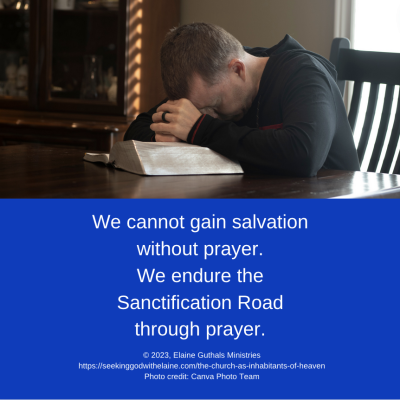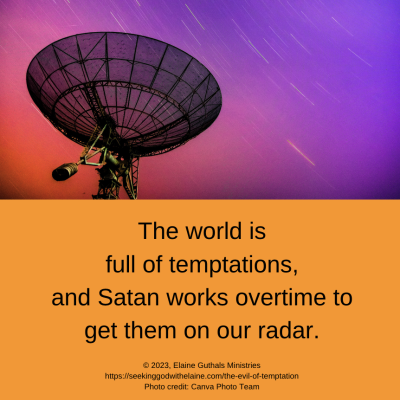
There wasn’t a good breaking point to have this newsletter come out in February. So, I finished the Communication series first.
Let’s see what we learned.

Main Nuggets
- Our sole purpose must be to repent and turn away from our sins. We must be seeking the transformation that is in the disciple’s job description (The Forgiving of Debts).
- It isn’t up to us to work everything out until we understand, and then submit to God. We have to give up our understanding and take on faith that God is supreme (The Doxology of the Lord’s Prayer).
- When we ABCD, we become a member of the family of God (Knowing God as a Loving Father).
- We cannot gain salvation without prayer. We endure the Sanctification Road through prayer (The Church as Inhabitants of Heaven).

Forming Our Habits to Grow Our Relationship with God
- God is a spirit, but He is also a Person. Being a spirit means He is not human, but that doesn’t mean He isn’t a Person (Knowing God as a Loving Father).
- Jehovah means I AM (What Is in the Name of God?).
- God wants to be present and accessible in our lives. We just need to call on Him (What Is in the Name of God?).
- YHWH, according to Genesis 15: 7, is God’s personal covenant name (What Is in the Name of God?).
- God loves us so much that He gave us His proper name. But like most things, God’s ways are higher than our ways (Isa. 55: 8-9), so we don’t understand it (What Is in the Name of God?).
- The use of Attiyq Youm occurs three times in the book of Daniel (7:9, 23, and 22) and in Isaiah (What Is in the Name of God?).
- People see Christianity as a big list of don’ts. It isn’t. The do’s make life so much more meaningful (What Is in the Name of God?).
- Called Elohim, God is not only all-powerful Creator of the universe, but He created everything in it (What Is in the Name of God?).
- Sin and sickness wasn’t created in God’s Creation. Man let that in because he didn’t want God to be relevant. He didn’t want to be obedient and submit to God (What Is in the Name of God?).
- El Elyon means the Most High God (What Is in the Name of God?).
- God is self-sufficient because He is in control. He doesn’t need anyone to bring things about. He can. He is King of kings and Lord of lords (What Is in the Name of God?).
- God is self-sufficient because He can do it all — far more than we mere humans can do (What Is in the Name of God?).
- El Shaddai means the All Sufficient One or God Almighty (What Is in the Name of God?).
- None of our problems are too big for God (What Is in the Name of God?).
- Emmanuel means God with us (What Is in the Name of God?).
- Jehovah-Tsidkenu means the God of My Righteousness (What Is in the Name of God?).
- El Roi means the God Who Sees Me (What Is in the Name of God?).
- God knows everything about us. He knows our thoughts and our troubles (What Is in the Name of God?).
- It doesn’t matter what we are going through. God sees us and will help us through it when we put our trust in Him (What Is in the Name of God?).
- Jehovah-Rapha means the Lord Who Heals (What Is in the Name of God?).
- Sin is a disease. God, in His infinite Mercy, sent His Son Jesus to die on the cross to heal us from our sins (What Is in the Name of God?).
- We know that God is the One Who heals our physical illnesses (What Is in the Name of God?).
- Jehovah Rohi means the Lord is My Shepherd (What Is in the Name of God?).
- God is so wonderful. He is patient. He directs us. He leads us. He cares for us (What Is in the Name of God?).
- Adonai, generally a substitute for YHWH, translates My Great Lord or Lord Master (What Is in the Name of God?).
- We would probably see this as YHWH being the formal name and Adonai the informal name (What Is in the Name of God?).
- Abba is even more personal, and we would say this is Daddy (What Is in the Name of God?).
- God is all those things to all of us at all times (What Is in the Name of God?).
- There can be only one King – God (God’s Kingdom on Earth).
- We are communicating with the One Who is above all others, created all things, and requires all from us. God is our Father because He created us in His image (Why We Should Pray to God; Knowing God as a Loving Father).
- To access God’s provision, we have to come to Him in prayer. We can only come into God’s presence to ask of Him when we are submitting ourselves to His Will. Philippians 4: 19 does not make God a gum ball machine, spitting out the gum ball just because we put in the quarter prayer. We have to submit our lives to God in order to access His choicest blessings. He wants us to acknowledge that we are dependent on Him to supply our needs (Knowing God as Our Father; Asking God for What We Want).
- Non-believers cannot ask of Him if they do not believe in Jesus and have accepted Him as their Savior (Asking God for What We Want).
- Nothing is greater or more powerful than God. Therefore, nothing can destroy Him (Why We Should Pray to God).
- Everything about God is holy. We need only look to His laws to see His holiness. God’s laws reflect His character (Why We Should Pray to God; Jesus as an Inhabitant of Heaven).
- God is the same yesterday, today, and tomorrow. That isn’t going to change. What He promises, He will deliver — regardless of us and our actions (What Is in the Name of God?; Why We Should Pray to God).
- Who wouldn’t want someone with those characteristics ruling them? God is perfect for the job. God doesn’t change. We can trust Him to be Ruler and Judge regardless of whether tomorrow brings peaceful times or chaotic times (Knowing God as Our Sovereign God).
- Because God created the world, owns it, and is supreme, He rules and judges it. God judges us and will judge us in the future. But He judges fairly. In fact, He judges with grace and mercy. He does not give us the judgment we deserve (Knowing God as Our Sovereign God).
- One of the best things is God will rule forever as He is an eternal being. He has no beginning and no end. He has always been and will always be (Knowing God as Our Sovereign God).
- It is God’s right alone to be Judge and Ruler. His wrath at our disobedience will finally be relieved. The only reason this can happen is because Jesus completed the Plan of Salvation. He paid the debt for our sins (The Doxology of the Lord’s Prayer).
- God created laws and commandments so that we can live in peace. He wants us to be more like Him (Knowing God as Our Sovereign God).
- God doesn’t want us to work on our own. He wants us to work in faith in Jesus’ name. When we draw near to God, He equips us for the tasks to which He calls us. When we abide in Christ through our prayer life, we grow in Him (Why We Should Pray to God).
- Because God is Sovereign God, He will be victorious in this battle with Satan. One day, Satan will be defeated and cast into a lake of fire (Rev. 20: 14) (Why We Should Pray to God).
- Doesn’t it seem like Satan is in control here on earth? Doesn’t it seem like God isn’t — and sometimes doesn’t care? That thought is totally wrong! God has a tight grip on the scepter. He is totally on His throne (Knowing God as Our Sovereign God).
- No part of this world is exempt from God’s power. Neither earth’s most intelligent being, nor its most powerful leader, is absolved from God’s power. All the Church, along with Satan and his demons, will all bow before Jesus (The Doxology of the Lord’s Prayer).
- Because God created this world, He owns it — the land and all of the creatures in it – and has not transferred ownership to anyone. He holds it for our good (Knowing God as Our Sovereign God).
- God didn’t create the world and then ignore it. He has His hand in every bit of it. We can feel God’s presence in the world. When we recognize how His work displays Him, we recognize its importance (Knowing God as Our Sovereign God).
- God didn’t make us and leave us on our own. He didn’t even leave us when we disobeyed Him. God provides for us — and not just bare minimum. He doesn’t limit it to easy provisions (Knowing God as a Loving Father).
- God doesn’t need us for any reason. He unselfishly wants to give us what we cannot give ourselves. We can only rely on His gifts (Asking God for What We Want).
- Many like to think of God only as a God of love. He isn’t. All His laws and commandments have a consequence if broken (Knowing God as Our Sovereign God).
- God is a Father because He is the Father of Jesus Christ. That puts God in the first position on the Trinity. The Father must give life to the Son. He provides for us (Knowing God as a Loving Father).
- God is also our Father because He redeemed us through Christ. The whole point of God giving His Son life was to die on the cross to give us access to heaven. The Sovereign God is approachable because He is our Father (Knowing God as a Loving Father).
- God used being our Father as an example so we could completely understand what He is telling us. He loves us like a father should love his children. In fact, He is a better example of how a father should love his children than any of the earthly fathers are (Knowing God as a Loving Father).
- God supplies for our physical and spiritual needs (Asking God for What We Want).
- God provides the food, clothing, job, support, etc. Every need. As in all. As in every single need we could ever have. But all means nothing if we haven’t asked Jesus to be our Savior and committed our lives to Sovereign God (Knowing God as a Loving Father).
- God provides for us when we seek Him. He is looking for our faith to rely on Him (Asking God for What We Want).
- We need to enjoy what God gives us. Enjoyment means we are grateful and use what He has given us to glorify Him (Asking God for What We Want).
- The world is governed by God’s laws of nature. We see the abundant intricacies throughout this world and marvel at how minuscule things work perfectly together (Why We Should Pray to God).
- Don’t think forgiveness happens because we repent — even though non-repentance doesn’t bring forgiveness. Don’t think we earn the forgiveness in any way. Honor God because He extends forgiveness to us through His grace (The Forgiving of Debts).
- A lot of times we get the praise wrong. We give thanks to God for what He has done for us. We may even paise Him for the spiritual graces He has given us. But we don’t always praise God for Who He is. We miss the most important part. We have to acknowledge that it is only God’s alone — Thine. We have to be thankful for God’s kingdom. We have to be thankful for the spiritual aspects (The Doxology of the Lord’s Prayer).
- We can’t miss the opportunity to praise God for His perfect kingdom, in which we will spend eternity (The Doxology of the Lord’s Prayer).
- We must praise God for His unmatched power. God’s power is not going to go away on January 31, 2035. God’s power is eternal (The Doxology of the Lord’s Prayer).
- We must praise God with honor and reverence (The Doxology of the Lord’s Prayer).
- Jesus said that all the glory belongs to God (The Doxology of the Lord’s Prayer).
Glossary

Forming Our Habits to Grow Our Maturity
- We are being sanctified. The whole goal of sanctification is that we possess God’s character. God forgives. We must, too, to be like Him (The Forgiving of Debts).
- As we strive to be consistent in our spiritual growth, it is necessary for us to be committed to spiritual disciplines that help us to grow. As we strive to be consistent in our spiritual disciplines, we need to be careful that we do not develop a mindset that causes us to regard our performance of these disciplines as something we check off on our list of things to do (Biblical Support).
- Sanctification is a hard process, one that where we will need help. We have to get it to the heart level. Since it is a process, we need to pray for the process. Our prayers should be to stay in God’s Will (God’s Kingdom on Earth).
- Therefore, God’s kingdom comes to us throughout the process. We can only tap that help through prayer (God’s Kingdom on Earth).
- We have to die to self. If we aren’t, God, Jesus, and the Holy Spirit have no room in us in which to reside (Why We Should Pray to God).
- The sanctification process isn’t complete yet because we are not totally obedient to God (God’s Kingdom on Earth).
- We have ever how much time is left to finish maturing. A lot of times, it is called getting right with God. We need to not procrastinate and do it (God’s Kingdom on Earth).
- Our goal is sanctification at the end of the process, but we have to go through every day to get there. Each day should be a step leading to that end (Asking God for What We Want).
- Our doing ensures the growth of our faith. While that doesn’t give us salvation, it ensures that our salvation stays healthy. What doesn’t grow, dies (The Church as Inhabitants of Heaven).
- One way we navigate the Sanctification Road process is helping Sovereign God expand His kingdom. We have to do it in His way, in His time, under His direction – through Him (God’s Kingdom on Earth).
- If we haven’t ABCDed yet, we still have the opportunity to do so. Once Jesus comes, we can’t change our decision. It has already been finalized (God’s Kingdom on Earth).
- Worship has to be objective. We have to keep our minds open to God doing the impossible (Lk. 1: 37) (The Doxology of the Lord’s Prayer).
Glossary

Forming Our Habits to Grow Our Relationship with Others
- A part of our spiritual growth takes place in understanding how we should relate to our brothers and sisters in Christ (Biblical Support).
- God has made it our duty to love others. Because God has loved and forgiven us, we are to love and forgive others. We are to forgive everyone, not just those who have sinned just a little against us. One thing that might help us forgive them is when we remember they were tempted, too. (The Forgiving of Debts; The Evil of Temptation).
- Forgiveness has a reason. We are blessed when we forgive others (The Forgiving of Debts).
- Each of us is in a different place when it comes to spiritual growth. Some are farther along their journey, while others are not as spiritually mature and not quite as far (Biblical Support).
- All throughout the Bible, it speaks of helping each other along the way, being an encouragement to one another; bearing one another’s burdens; and similar ideas that speak to supporting each other (Biblical Support).
- Working together towards a common goal is a very Biblical idea. No church is a one-person effort. God has given each of us at least one spiritual gift for us to use in the building of His kingdom, reaching the lost (Biblical Support).
- We are not meant to go it alone when it comes to walking out our faith. We are intended to be a part of something that encourages and supports us as we go through the trials and tribulations of being a Christian in this world (Biblical Support).
- So many in the church these days want to be in the spotlight— the one whom everyone in the congregation turns to for everything. But we are not meant to work on our own; neither are we meant to seek our own glory. We are meant to do everything we do for the glory of God (1 Cor. 10: 31) (Biblical Support).
- A lot of support we get comes from times when we need to be comforted. When we are going through various afflictions, it is very easy to be beaten down and gain a degree of hopelessness (Biblical Support).
- By bearing one another’s burdens, we are fulfilling the “law of Christ.” Everything that God’s law is about is about love! Loving Him and loving our neighbor as much as we love ourselves (Biblical Support).
- Loving people is a support that most of us have never thought about. And the amazing thing is, we are fulfilling the law of God by doing it (Biblical Support).
- So many are wrapped up in their “pharisaic mindset,” being more concerned about keeping the rules and checking off their lists of what they have done to “serve the Lord,” but they have no love for anyone except themselves. This is not fulfilling the Law of the Lord, and they are certainly not supporting anyone either (Biblical Support).
- Encouraging one another and building each other up is one of the greatest things we can do for each other in a church. Many churches have not recognized this and have grown into a church of hyper-critical people and are slowly dying (Biblical Support).
- When we stop encouraging each other, building each other up, it reflects on the kind of church we have become. If we do not encourage, we are not supporting and have turned into a backbiting, gossiping, hateful, and yes, I will say it, an ungodly church! (Biblical Support).
- Jesus said that we have to forgive as God forgives (The Forgiving of Debts).
- God point blank says forgive. Not partially. Certainly not in words only. Immediately, completely, absolutely, and heartily (The Forgiving of Debts).

Heaven
- God’s kingdom is a spiritual kingdom, the Church. We must praise God for it. He is more interested in our eternal condition. He is interested in our souls (God’s Kingdom on Earth; The Doxology of the Lord’s Prayer).
- At a specific point in the future, God will stop individually calling us home to Heaven and call the Church as a whole (The Church as Inhabitants of Heaven).
- One day, we will ascend to Heaven to be with Jesus. Only those that accept salvation and endure the Sanctification Road will become the Church and eventually reside in Heaven (Jesus as an Inhabitant of Heaven; The Church as Inhabitants of Heaven).
- God wants us to focus on the eternal. That is where we get our joy (Asking God for What We Want).
- In a way, Heaven is a very mysterious place. Heaven is important because that is God’s dwelling place, His home. It is a holy place because He is holy (Which Art in Heaven).
- The most comprehensive description we get of heaven is in Revelation 21: 18-21. We don’t know how accurate of a picture that is. John was trying to describe a beautiful place. He described gold, precious stones and pearls such as in jewelry (Which Art in Heaven).
- Heaven is an actual place right now. While we will someday call it our home, currently, the angels inhabit it (Which Art in Heaven).
- Even though the Bible has many references to angels, there are opposing opinions of what and who angels are and do and how they came to be (Which Art in Heaven).
- The first and foremost purpose of angels is to worship and praise God. Angels provide a good example of how we should continuously praise God (Which Art in Heaven).
- As their name means, angels are the messengers of God. God answers prayers. Sometimes, He uses angels as the messengers to deliver the answers (Which Art in Heaven).
- We will see God’s truth as it becomes clearer to us. It cannot be clear to us until we have bodies that have been perfected. But that emphasizes the fact that we will live with God forever. Eternity is a long time – and we will spend it with Him (The Church as Inhabitants of Heaven).
- There will be no church/temple in Heaven. Church as we know it is going to change in Heaven. We won’t need church as we did on earth (The Church as Inhabitants of Heaven).
- As Jesus had descended to earth, it is only natural that He ascend again to Heaven. Ascension back to Heaven was a really important part of the Plan of Salvation. It was very important that Jesus go back to Heaven alive. He had conquered sin, which had ushered in death. We are free and able to obtain His character. It was important that the disciples had to see Jesus – then not see Him. They had to see there was more after life on this earth (Jesus as an Inhabitant of Heaven).
- After Jesus returned to Heaven, He was given a place of honor – at the right hand of God (Jesus as an Inhabitant of Heaven).
- Once eternity begins, there will be nothing that can separate us from Jesus. Oh, wait! Don’t we have that now? (Jesus as an Inhabitant of Heaven).
- We know we are to walk in the Spirit here on earth. We won’t be in the Spirit in Heaven, but we will be doing the same walk – obeying God. That isn’t going to change (Jesus as an Inhabitant of Heaven).
- Heaven is the meeting place where we will come into contact with that goodness (Jesus as an Inhabitant of Heaven).
- Jesus is the One Who is praying, but it is also His kingdom that is coming (God’s Kingdom on Earth).
- The best news is that, since God is eternal, so is His kingdom (God’s Kingdom on Earth).
- To seek the kingdom of God, we submit our whole hearts and lives to God. We can only find it through submitting to Him (God’s Kingdom on Earth).
- We think we can gain entrance to God’s kingdom by doing good deeds – essentially being a good person. We can’t. We can only be ushered into God’s kingdom when we commit to becoming like Him. Our character must be like His (God’s Kingdom on Earth).
- We cannot go to the kingdom. It has to come to us. God calls us to salvation (God’s Kingdom on Earth).
- Focusing on our eternal life brings us contentment. We aren’t desiring what we shouldn’t have. We aren’t even asking for what we wish we had. We are asking for what we need (Asking God for What We Want).
- While God has plans for our future, He wants us to rely on Him for the day (Asking God for What We Want).
- God wants us to know He has a plan for us (Jer. 29: 11); therefore, we should have similar plans. He doesn’t want things left to chance. However, God also knows that our plans change. “We can make our plans, but the LORD determines our steps” (Prov. 16: 9 NLT) (Asking God for What We Want).
- Our praise to and worship of God will never end (The Doxology of the Lord’s Prayer).
Glossary

Prayer
- Praying shows how much we want for God’s kingdom to come. When we consistency communicate with God, we gain perseverance (God’s Kingdom on Earth; The Evil of Temptation).
- Until we can communicate face to face, we communicate with the Creator through prayer. But we don’t take advantage of that, as we should (Why We Should Pray to God).
- Prayer isn’t what we say. It is what we feel. It is the motivations behind it. It is the purpose for it. It is the One to Whom we are talking. The words aren’t important. The length isn’t important. The worship is important (Which Art in Heaven).
- For now, prayer is one way in which we praise God. We should use it to consistently communicate with our Creator (Which Art in Heaven).
- We sometimes blame God for our troubles. To punish God, we stop praying to Him. Withholding our prayers solves nothing. Instead of drawing us to God, it takes us further away from Him (The Evil of Temptation).
- Asking lawfully means that we don’t put more emphasis on physical things than spiritual things. It also means we have to follow God’s plan for our lives, not our own (Asking God for What We Want).
- We can ask for physical things to support our spiritual growth and ministry. They may be needed for us to serve God (Asking God for What We Want).
- If we don’t ask God to provide for our physical needs, Satan can use those to tempt us (Asking God for What We Want).
- One of the benefits of prayer is we stop looking only at what we want. We become open to seeking God’s Will and find we enjoy more the lives He wants us to live (Asking God for What We Want).
- We may be asking for what we want, but we know that God supplies all things. God gives us what we need. He tells us this in His Word. He delights in providing for us (Asking God for What We Want).
- We seal our prayers with an Amen. By saying amen to our prayers, we agree with what we have said and accept God’s answers to those prayers. We are firm our belief in God’s truth and faithfulness (The Doxology of the Lord’s Prayer).
- Did you notice what the Lord’s Prayer doesn’t have a lot of? Father, heal Andrew. Help Peter in his marriage. Change James’ and John’s character. (Please take the thunder out of them!) What does most of our prayers contain? Supplications for things in this world. We need to refocus on God (The Doxology of the Lord’s Prayer).
- We would rather do for God than pray to God. We substitute service for submitted living (Why We Should Pray to God).
Glossary

Sin and Temptation
- Debts is an interesting term for sin. We cannot pay this sin debt. With our sinful nature so ingrained within us, we cannot pay the penalty for sin ourselves. Only Christ can pay the debt for our sins (The Forgiving of Debts; The Forgiving of Debts).
- Some worldview people say that God shouldn’t call some things sin. We don’t think there should be a liability for sins because want we don’t the consequences. Doing things that are not in His character is sin (The Forgiving of Debts).
- The story doesn’t stop at the commission of sins. That is where the forgiveness begins. We ask for God’s grace to forgive us of our sins (The Forgiving of Debts).
- We can only be forgiven when we agree to submit our lives to God. He will not forgive us if we continue to willfully sin (The Forgiving of Debts).
- Our whole purpose of asking God to forgive our sins should be to submit our lives to Him. We show that be becoming like Him (The Forgiving of Debts).
- It doesn’t work if our repentance isn’t sincere. Our worship isn’t sincere. Our praise isn’t sincere (The Forgiving of Debts).
- Temptations are a part of life in order for us to grow in faith (The Evil of Temptation).
- We are preparing for our life during eternity. We have to be transformed to have God’s character in order to gain entrance to Heaven. Temptations aid us in the transformation (The Evil of Temptation).
- The temptations we face relate to God because Satan is trying to get us to do the opposite of what God wants us to do (The Evil of Temptation).
- We can’t resist temptation alone, rather God delivers us. There is no way we are going to withstand Satan by ourselves (The Evil of Temptation).
- Sometimes, God does what we want. He takes away our proclivity to sin. We no longer have the appetite for that temptation (The Evil of Temptation).
- We have to be on guard. We have to watch because Satan is going to try to slide something in on us. Even if the temptation comes from the world, it has to be addressing something we find tempting. That has to come from the inside. The temptation has to stem from a weakness within our faith. Faith is an inside thing. Isn’t that the whole purpose of temptations that it shows us where we are weak and need work? It cuts out that associated sin (The Evil of Temptation).
- We can’t fight Satan on our own strength. We have to rely on God’s strength and power (The Evil of Temptation).
- All sin comes from Satan. All evil is opposed to God’s good. Whether we are focusing on the who or the what of sin, it is taking our focus off God (The Evil of Temptation).
- God may tell Satan that he can’t tempt us in a certain way or at a certain time. God has control (The Evil of Temptation).

Making the Connections
- I think we need to focus more on being connected and similar. We should see ourselves as God sees us — perfected through the blood of Jesus. Bottom line is that we have to recognize God as our Father and submit to His Will (Knowing God as a Loving Father).
- We aren’t entitled to things just because we call God our Father. We especially aren’t entitled to things just because we are breathing. All the blessings we receive come from God. He blesses our obedience (Knowing God as a Loving Father).
- We just have to know when God is talking to us and nudging us to do His Will. That is hard sometimes. God’s voice is drowned out by the chaos in our lives (Which Art in Heaven).
- We have to stand firm and choose God’s way. That will bring peace to this life and eternal life. One day we will see God face to face (Which Art in Heaven).
- But, you know, it is not going to matter what heaven looks like when we get there because “Behold, the heavens and the heaven of heavens is the Lord’s thy God, … (Deut. 10:14 KJV). God is going to be there, and we are going to be able to see Him. It will be so wonderful to live with our Father forever (Which Art in Heaven).
- Our prayers reach God regardless of where we are. We don’t have to be in a church or synagogue. We could even be in a bar, and God would hear a sincere prayer from one of His children (Jesus as an Inhabitant of Heaven).
- The prayers of the greatest disciple doesn’t have precedence over mine. Mine doesn’t have precedence over someone else (Jesus as an Inhabitant of Heaven).
Glossary

To read devotions in the Support and Communication series in the Committing to Grow Our Habits study, click the button below.
